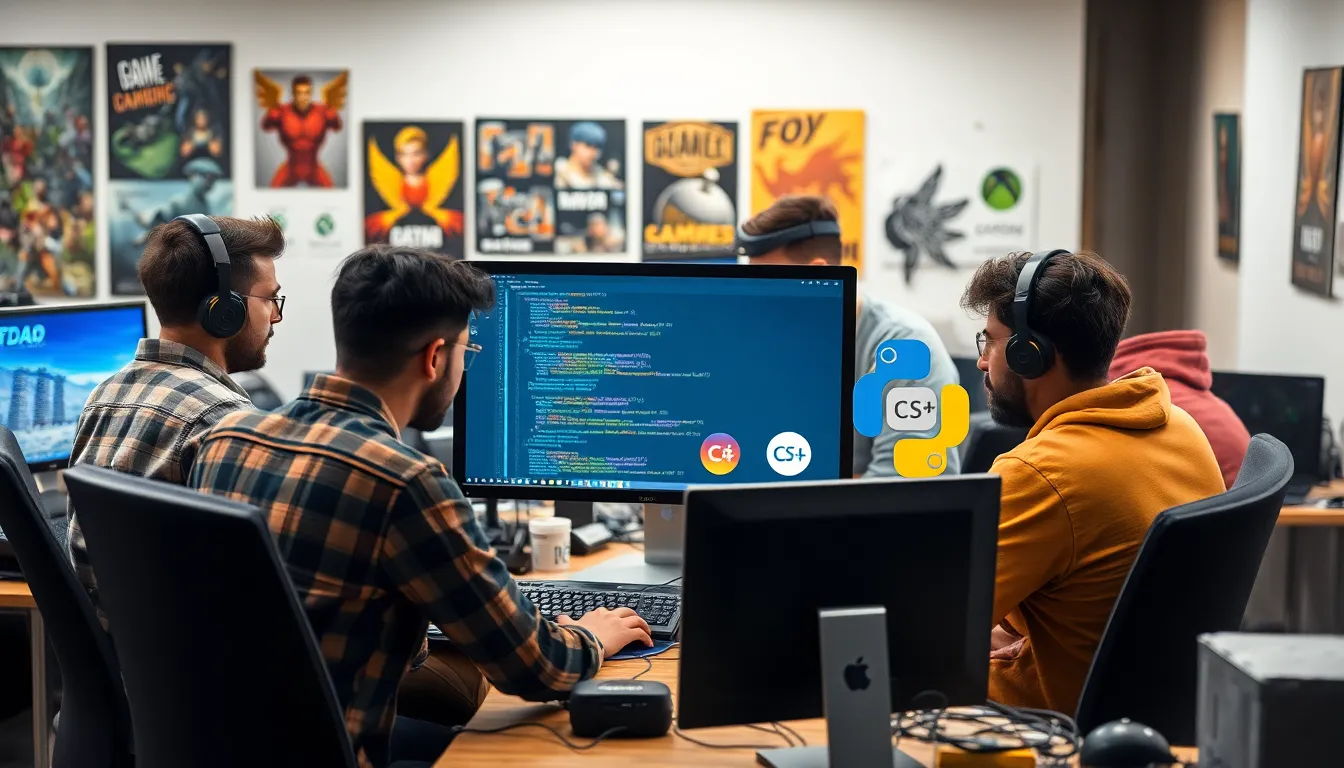In a world where dragons roam and spaceships zoom through galaxies, programming for games is the magic wand that brings these fantastical realms to life. It’s not just about writing lines of code; it’s about crafting experiences that captivate players and keep them coming back for more. If you’ve ever dreamed of creating the next big hit that’ll have gamers glued to their screens, you’re in the right place.
Table of Contents
ToggleOverview of Programming for Games
Programming for games encompasses various disciplines and skills, making it a multifaceted field. Developers utilize programming languages like C++, C#, and Python to create gameplay mechanics, graphics, and user interfaces. Each language serves specific purposes, enhancing performance and efficiency in game development.
Game engines play a crucial role, offering built-in tools and frameworks to streamline the development process. Engines such as Unity and Unreal Engine allow developers to focus on creativity while handling complex tasks like physics and rendering. Utilizing these engines accelerates game production and improves quality.
Artificial intelligence, or AI, significantly enhances player experiences. Developers implement AI to create non-player characters that respond intelligently to player actions, providing dynamic interactions. Techniques like pathfinding and decision-making algorithms ensure engaging gameplay.
Networking is another essential aspect. Online multiplayer functionality requires robust programming to manage interactions between players and the game server. This complexity demands knowledge of server architecture and data synchronization, ensuring a smooth multiplayer experience.
Graphics programming contributes to visual storytelling. Shaders, rendering techniques, and optimization methods enhance the visual appeal of games. Developers create immersive worlds by focusing on the details of lighting, textures, and animations.
Game testing verifies all aspects work cohesively. Programmers conduct extensive testing to identify and fix bugs, ensuring stability and performance before release. Continuous testing throughout development minimizes issues and enhances player satisfaction.
Programming for games integrates various disciplines, shaping memorable and engaging experiences. By mastering important programming concepts and tools, developers can manifest their creative visions while captivating audiences worldwide.
Key Programming Languages

Different programming languages play critical roles in game development. Each language aims to optimize performance and enhance gameplay experiences.
C++
C++ remains a popular choice for game development due to its performance capabilities. Developers utilize C++ to create complex game engines and high-performance applications. Its object-oriented features promote code reusability, making it easier to manage large projects. Popular game engines like Unreal Engine are built using C++, allowing developers to harness its speed and efficiency. Knowledge of memory management and low-level programming enhances the development process, making C++ an essential skill for aspiring game developers.
C#
C# serves as a user-friendly option for developers focusing on game design. It is the primary language for Unity, one of the most widely used game engines. C# simplifies game logic and user interface creation, making it approachable for beginners. The language’s strong typing and features like garbage collection enable efficient memory management. Developers often find C# helpful for rapid prototyping and iteration, allowing for a smoother workflow during game development.
Python
Python stands out for its readability and simplicity, appealing to new developers. While not as commonly used for high-performance games, it excels in scripting and automation tasks within game engines. Developers often use Python for creating prototypes and tools that aid in the game development process. Its extensive libraries and frameworks, such as Pygame, provide a solid foundation for 2D game creation. Learning Python fosters a deeper understanding of programming concepts, benefiting those pursuing a career in game development.
Game Development Frameworks
Game development frameworks provide essential tools that assist developers in creating engaging experiences. These frameworks offer a variety of functions and features tailored to enhance the gaming process.
Unity
Unity stands as one of the most popular game development frameworks today. It supports cross-platform development, allowing developers to create games for consoles, mobile devices, and PCs with ease. The engine features a robust asset store packed with pre-built assets, reducing development time. Developers often favor Unity for its user-friendly interface, making it accessible for beginners and experienced developers alike. C# serves as the primary scripting language, enabling the integration of intricate gameplay mechanics and user interfaces. Unity’s built-in physics engine simplifies real-time simulations, providing immersive player experiences across diverse genres.
Unreal Engine
Unreal Engine, developed by Epic Games, stands out for its high-fidelity graphics and advanced capabilities. It employs C++ as the primary programming language, which allows developers to optimize performance for graphics-intensive applications. The engine’s Blueprint visual scripting system offers a unique way to create game logic without extensive coding. Developers can leverage its powerful rendering engine to create photorealistic environments, enhancing overall visual appeal. Unreal Engine’s versatility accommodates various genres, from first-person shooters to immersive role-playing games. Its built-in marketplace provides access to user-generated content, accelerating the development workflow.
Godot
Godot has gained traction due to its open-source nature and flexibility. Many developers appreciate its lightweight design, which allows for rapid prototyping and deployment. The engine features GDScript, a Python-like scripting language, making it easy for beginners to learn and implement game features. Cross-platform capabilities ensure that games can run on multiple operating systems efficiently. Developers can create 2D and 3D games with ease, thanks to its comprehensive features and node-based scene system. Additionally, Godot’s active community provides valuable resources, tutorials, and support, fostering an inclusive environment for developers at all skill levels.
Essential Concepts in Programming for Games
Game programming involves critical concepts that enhance the gaming experience. Understanding these elements empowers developers to create immersive environments and engaging gameplay.
Game Physics
Game physics simulates real-world behaviors, making interactions feel believable. Developers implement physics engines like Box2D and NVIDIA PhysX to handle movement, collision detection, and gravity. These engines provide the foundation for realistic object interactions and movements. Factors such as friction, momentum, and weight influence how objects behave. By incorporating realistic physics, games can enhance player immersion and engagement. Real-time responses to actions in the game create a dynamic environment, leading to a more satisfying gameplay experience.
Artificial Intelligence
Artificial intelligence (AI) plays a significant role in enhancing player interactions. Non-player characters (NPCs) utilize AI algorithms to react intelligently to players’ actions. Pathfinding techniques, such as A* and Dijkstra’s algorithm, allow NPCs to navigate complex environments with fluidity. Additionally, behavior trees manage multiple NPC states, enabling more realistic decision-making processes. Incorporating machine learning can further enhance AI’s adaptability based on player behavior. These technologies enrich gameplay, making encounters more dynamic and unpredictable, thus increasing player engagement.
Best Practices in Game Programming
Employing best practices in game programming enhances efficiency and improves overall gameplay. Developers focus on various techniques to streamline code and manage project changes effectively.
Code Optimization
Optimizing code ensures performance and responsiveness in games. Programmers use algorithms that execute efficiently, reducing load times and enhancing frame rates. Redundant code appears in every programming project; eliminating such code optimizes performance. Measuring the impact of changes through profiling tools helps identify bottlenecks. Implementing advanced techniques, such as multithreading, further enhances execution speed, making gameplay smoother. Developers can also prioritize memory management to reduce crashes and slowdowns.
Version Control
Version control is essential for collaborative game development. Utilizing version control systems allows multiple developers to work on different features simultaneously without conflicts. Git remains a popular choice among programmers, supporting branching and merging workflows. Each team member can commit changes, which simplifies tracking improvements and reverting code to previous versions when necessary. Maintaining a well-structured repository fosters communication and organization within the team, ensuring everyone stays aligned on project progress. Regular pull requests encourage code reviews, enhancing overall code quality and collaboration.
Game programming offers a thrilling journey filled with creativity and technical challenges. By mastering various programming languages and tools, developers can bring their imaginative worlds to life while ensuring smooth and engaging gameplay. The blend of art and science in game development empowers creators to craft unforgettable experiences that resonate with players.
As technology continues to evolve, the opportunities in game programming will only expand. Aspiring developers should embrace this dynamic field, honing their skills and exploring new techniques. With dedication and passion, they can contribute to the ever-growing landscape of interactive entertainment, shaping the future of gaming for generations to come.





